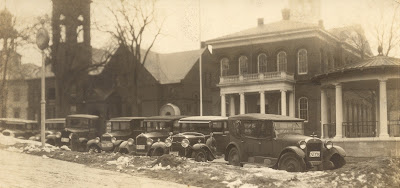Town Meeting in Exeter
The latest "Historically Speaking" column appeared in the March 4th issue of the Exeter News-Letter.
by Barbara Rimkunas
Our venerable New Hampshire practice of holding town meetings each year dates to the 1630s. Back then, the practice was simple enough – get all the voting men together for the day, grease them up with a fair amount of rum or hard cider, talk about the important town issues and vote on how to act on the issues.
Shortly after Europeans began arriving in Exeter in 1638, meetings were held fairly frequently to divvy up the land and make sure everyone got a share. These early town meetings probably weren’t very exciting – at least as far as the records tell us: “ Robert Smyth 6 acers 30 poole butting as aforesayd: Goodman Littlefejld 4 acers 20 poole butting as aforesayd….” the lists go on and on. It takes a fair amount of reading before you finally get to the town’s real issue in 1641:
“Its ordered yt Goodman (name obscured) shall allow the Indeans one bushel of corne for yr labor wch was spent by ym in replaynting of yt corne of yrs wch was spoyld by his swine, and hee to make up yr lose at harvest according as yt corne may be indged worse then there corne wch was nevr hurt.”
Although the spelling might lead one to believe that early Exeter citizens were the inventors of text speak that our kids use, it really indicates a much larger problem within the town. The Squamscott natives had been guaranteed the right to plant and harvest their own crops, and one of the townsmen had been foolish enough to let his pig run wild through the fields. Pigs were the biggest problem in early Exeter. Mandatory fencing laws quickly followed.
Under the old calendar system the year began in March, so that was when the meeting was held. There were quite a few drawbacks to a March meeting. Travel is poor during the mud and slush season and some of our biggest snowstorms have taken place in March. Nonetheless, March it was and March it would continue to be.
The tradition of town meeting continued, unchanged, after the American Revolution. The town was small enough that most of the men could fit into a single space. Not all of the men would show up anyway, so they never realistically had to make room for everyone. Those who did appear, it was thought, were those who really mattered. In Exeter, as in most towns, it was vital to hold the meeting in the center of town near the local taverns. Town meeting was a long day and refreshment, of one kind or another, was needed.
Once the beautiful Exeter Town Hall was erected in 1855, the meeting took on a more distinguished locale. The men could gather on the floor and the ladies could listen – but not participate – from the gallery above. The floor was strewn with sawdust to absorb the inevitable mud tracked in from the street and the participants argued the warrant with enthusiasm. In 1890, the Exeter News-Letter advised: “Every voter should carefully read the town warrant and decide upon his course of action before he becomes confused with town meeting oratory.”
There was no secret ballot at the town meeting, a vote of “aye” or “nay” would carry or defeat such important issues as were brought up. In 1890, the issues involved approving the new street gas lights, extending sewers to Grove, Elliot, Court and Elm Streets and where to place the new hose company house. They also appropriated $800.00 to purchase a pair of horses for the fire department.
When the secret ballot (or Australian ballot as it was known) was approved for the November elections, the News-Letter sadly commented, “whatever may be merits or demerits of Australian balloting, it has certainly robbed election meetings of nearly all interest to the spectator.” Luckily, it was never used for town meeting. Town meeting was all about entertainment.
In 1898, Exeter judge Henry Shute complained about the general levity of town meeting. “The hall is full of smoke, there are not seats enough, and the people walk restlessly to and fro, talk gossip, laugh and pay but little attention to the speakers, unless the discussion waxes warm, when there is a rush forward, and the speakers are loudly applauded or roundly hooted, as their opinions find favor or otherwise with the audience. Small boys and some not so small chase each other and wrestle, and the occasional attempt of some inebriated gentlemen to harangue the crowd in the back part of the hall meets with great favor.” In spite of his indignation, there is little evidence that the atmosphere changed much over the years.
In 1996 New Hampshire towns were allowed to adopt a balloting system. Hated by some and loved by those of us who could never attend town meetings because of work schedules or lack of childcare, it was adopted in Exeter in 1998. Voting on a ballot may not be as entertaining as getting caught up in the verbal sparring at a town meeting, but it does calm down the mob rule feel of the old days.



Comments